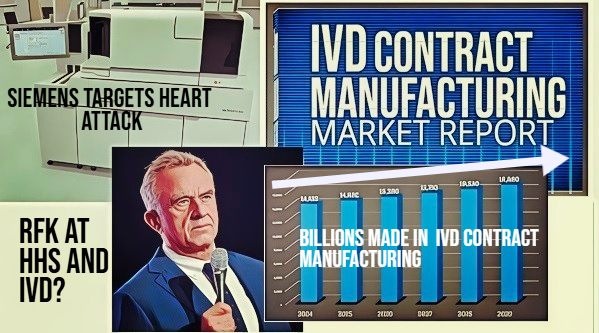According to Siemens, nearly 49% of patients with elevated troponin I levels may experience a major adverse cardiac event or death within the year. For this reason, Siemens Healthineers has been highlighting the FDA clearance of a new prognostic indication for its Atellica IM high-sensitivity troponin I (TnIH) test. The blood test helps healthcare providers identify patients at risk of death or major cardiac events within one year after presenting to the emergency department (ED) with acute coronary syndrome symptoms.
Cardiac troponin I is a biomarker for heart muscle injury.
Siemens in a press release featured the use of the marker by a customer. Dr. Alan H.B. Wu, Core Lab Co-Director at Zuckerberg San Francisco General Hospital, emphasized the test’s impact: “ The prognostic insights from this test could help address high readmission rates for cardiac patients, which reach 30% within the first year after an initial heart attack. By guiding lifestyle changes and follow-up care, the test may enhance patient outcomes, reduce emergency room revisits, and save lives.
Where possible, prognostic use of diagnostic tests can open up new revenue for existing IVD tests, something to watch will be if this is just troponin or if similar marketing works with other IVD tests.
$14 Billion in Contract Manufacturing
Someone’s got to make the tests that the IVD industry sells. Unlike in some industries, say electronics, in IVD that’s usually the manufacturer you see on the label. Most work is done in-house. But that’s been changing each year. Thus, there’s a market hidden within the in vitro diagnostics market, and that’s the market for those that make the products used in clinical testing there are scores of companies in the field. The current market for companies making parts of IVD systems or whole systems, as well as supplies is $14.1 billion, growing to $16.9 billion in 2029. This per our ivd contract manufacturing market report, available for purchase – CONTRACT MANUFACTURING IN IVD MARKETS – Eye On IVD The report breaks down which disease categories, which types of contract manufacturing and what geographies will see an increase in revenues. In this market, competition is scattered and no one company dominates. Most perform work in other industries. Some companies may do no more than a part or a metal mold. Others build complete analyzer systems, and many produce antibodies or reagent materials and kits that are needed for the increase test volume.
RFK Jr. Potential Nomination and IVD
It’s not our policy to comment on politics; however, the possible nomination of Robert F. Kennedy Jr.’s as the U.S. Secretary of Health and Human Services (HHS) under a Trump second term has ignited intense debate, including in healthcare business media. There could be a question of what this might mean for in vitro diagnostics? while we don’t have any definite answers, as despite Kennedy’s history of making statements antagonistic to the medical establishment we don’t know what politices will be pursued or prioritized.
With a Republican Senate majority likely in January, Kennedy’s confirmation may become a smoother process, although resistance could still prompt Trump to consider a recess appointment to bypass opposition.
In regards to RFK Jr’s potential appointment, we’d note the following:
- PHARMA CROSS-EFFECTS: What affects pharmaceutical companies affects IVD, to some degree. To start with, our two largest companies in in vitro diagnostics, Abbott and Roche, are pharmaceutical companies. Pharma is concerned, as are investors. An article in Marketing and Pharma is worth a read –https://marketingandpharma.com/a-vaccine-skeptic-hhs-boss-drug-pricing-uncertainty-and-tv-ad-bans-what-the-trump-second-term-might-look-like-for-pharma-marketers/? Following the announcement about RFK Jr., major vaccine manufacturers experienced stock price dips, reflecting industry unease.
- IVD NOT A DIRECT TARGET: But not all IVD companies are pharma companies, most are not. Besides those companies that are pharma companies, or sell a good deal of companion in vitro diagnostic tests, IVD operates on a smaller fringe off-the-radar. For a moment it’s a good thing. There doesn’t seem to be too much in RFK’s statements specifically targeted at in vitro diagnostics. That doesn’t mean policies couldn’t come later. IVD has, by nature of its regulated pricing and small industry size – the whole IVD market is no larger than the yearly revenue of two or three pharma companies. Since IVD never became “Big IVD,” it can’t be linked to Big Pharma in rhetoric.
- ADMIN NO STRANGER TO IVD: Yet, speaking for a moment about the incoming administration generally, it has been around during the pandemic, and is familiar with IVD products and their function, roughly. That reputation was earned in a crisis. And to our memory Trump’s was the first White House to have IVD products on display in a Rose Garden press conference. That kind of familiarity could elevate discussions where IVD policy is discussed.
- CUTTING EMPLOYEES NOT A BOON: Hearing that a new chief will “fire regulators” or “cut agencies” or “red tape” warms a device makers heart. But if the idea is merely cutting agencies or staff, without corresponding regulatory legal changes, then a reduction of staff is adverse to the IVD business. It means slower approvals for competitive and innovative test products.
- IVD NEEDS DOCTOR VISITS (AND SOME FUNDING FOR THOSE VISITS): Preventative medicine is key to IVD sales. not only in the first instance but in the second and third and thereafter. One might say checkups involving an IVD test are the “in-house marketing” for advanced IVD. The doctor’s visit leads to a discovery of ill patients, who by nature of treatment will require further advanced testing. But it doesn’t happen if there’s no first doctor visit. And market research studies I’ve been part of during the 2008 recession shows, if funds are low, patients opt to not see the doctor. Thus RFK’s position on ACA and for that matter, Medicare spending, will be essential to know.
- RKF POSITION ON ACA UNCLEAR: It is not fully known (article here with some speculation – https://news.bloomberglaw.com/health-law-and-business/rfk-jr-fuels-uncertainty-on-policies-from-medicare-to-abortion ), But if there is a plan to change the Affordable Care Act or dramatically alter federal policies that subsidize healthcare, this could be said to be “market-negative” for makers of testing products. Absent funding, poorer patients vote with their feet and do not go to the doctor. The IVD industry thrives on doctor visits. Anything that reduces visits reduces preventative care, reducing testing and reduces volume for test makers.
- WHAT ABOUT A NEW PROGRAM: So even if a plan is made to replace ACA with say a Healthy America alternative that might indeed focus on IVD-friendly items like preventive visits, wellness checks, home testing. That will be good for the industry at some point, but the disruption will cost. Benefits will not be seen until the replacement is instituted. After COVID, this is not an industry that needs a drop in revenue.
- REGULATORY BURDEN REDUCTION: On the more positive side – RFK Jr. is on record of supporting some limits to regulation. As opposed to reducing staff, regulatory burden reduction could be a help to bring additional competitors with innovative solutions to the market. These actual regulatory reductions would have to be seen before further comment. For IVD companies who have clients producing lab-developed tests, it may well be that given his statements about regulation LDT regulation at the FDA falls if it gets beyond the courts.


